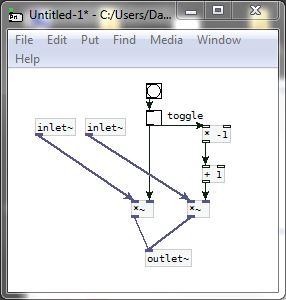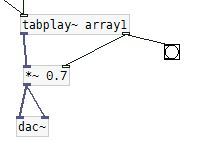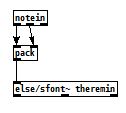-
 whale-av
posted in technical issues • read more
whale-av
posted in technical issues • read more@rewindForward Object I don't know but simple to build.....

You might need to smooth the switch using messages to [line~] or [vline~] instead of [*~ ]
David. -
 whale-av
posted in extra~ • read more
whale-av
posted in extra~ • read more@kroklop92217 It might help to look at @Porres 64-bit rewrite of the 2005 16-bit cycone object [matrix~].
https://github.com/porres/pd-cyclone/blob/master/cyclone_objects/binaries/audio/matrix.c
Control input lists are probably the same...... (Input id, output id, gain 0-1(
Creation arguments set the number of inputs and outputs and 1-mix.or.0-switch(
i.e. [matrix~ 5 7 1]
David. -
 whale-av
posted in technical issues • read more
whale-av
posted in technical issues • read more@_ish The vanilla version is [random] which spits integers.
You could use a few of them and [* 0.1] ... [* 0.01] for each..... adding the outputs.... if you want more decimal places.Bangs at loop wraparound... https://forum.pdpatchrepo.info/topic/3168/bang-on-zero
So it depends on how you are driving the array and how much time accuracy you need but [edge~] might be good enough.
As in that link if using [phasor~] catching it's output as it passes 0 is unreliable because the value of [phasor~] will likely not be 0 as it is captured at a block boundary.
There are audio rate objects that can set future events within the 64 sample blocks of the Pd audio thread, so achieving more time accuracy.
Their names usually start with a "v"
So [vline~] is a more time accurate version of [line~] for example.But for most uses whether a bang is at one block boundary or the next is unimportant.
Audibly it is as if the origin of the sound has moved just one metre further away from you.If you are looking for an external object (not part of your vanilla download) then go to Help.... Find externals..... in the Pd top menu and search for it.
[randomf] is in the markex library.
David. -
 whale-av
posted in technical issues • read more
whale-av
posted in technical issues • read more@ddw_music Oh no...!!... I aimed for both....
David. -
-
 whale-av
posted in technical issues • read more
whale-av
posted in technical issues • read more@_ish No, the GOP window cannot be set by the mouse. You have to put values into the Size and Margin boxes in its properties dialog.
When you click "apply" you will see the changes whereas if you click OK you will have to open the properties again to make further adjustments.Welcome to the Forum...!
David. -
 whale-av
posted in technical issues • read more
whale-av
posted in technical issues • read more@Glop-Glop It is $2 causing the problem.
In your resize message you specified $1 AND $2 for the bounds but $2 was not specified so would have been given the value 0 (zero).
You need to pack a message [16 x ( where x is the value you want for max-y and send that into your resize message.
The order for the message is confusing but you had the correct order..... min-x max-y max-x min-y ... so you had set max-y as 0.
More help...... https://forum.pdpatchrepo.info/topic/11374/array-settings-break-pd-gui-and-control/3Strangely (maybe not) your patch opens in Pd Extended despite the error (yes I am still a fan..!)
David. -
 whale-av
posted in patch~ • read more
whale-av
posted in patch~ • read more@playinmyblues Discord has a very active Pd channel that you might well find interesting.
Maybe not so easy to find what you want there, but interesting patches are posted and that community is also active for problem solving.
Mike Moreno runs it and the invite link is this........ https://discord.gg/aNd8RrT
He also runs online meetups there from time to time...
... you just missed the most recent one though https://forum.pdpatchrepo.info/topic/15779/pd-open-sessions-jan-2026-discord
David. -
 whale-av
posted in technical issues • read more
whale-av
posted in technical issues • read more@jameslo Being incapable of all understanding of the cookbook I have always used [notch] [lowpass] [equalizer] etc. from the ggee library..... there are quite a few of them.
Bandwidth in octaves (value 100 = 1 octave) but 1 am not sure that is linear for calculating Q.
Of course you can print the coordinates produced by the objects.
Maybe they will help your research though..?
David. -
 whale-av
posted in technical issues • read more
whale-av
posted in technical issues • read more@elmestrecalleu [pdcontrol] is part of Pd Vanilla... not an external but part of the Pd binary (since I think Pd 0.51)
You should be able to simply create (put) it into your patch.
David. -
 whale-av
posted in technical issues • read more
whale-av
posted in technical issues • read more@Yar You can try to find them for your system.
In the Pd top menu.... help..... find externals.... search..
tabletool and polygate~ exist updated for windows 64 bit but not polygate.
Help.. find externals... will only find externals for your OS.
Github might contain what you are looking for with the possibility to compile, but most externals have already been compiled for 64 bit systems now (by very helpful people).It might be an abstraction created by @ricky and he might show up here and help.
You can try a browser search..... "pdpatchrepo polygate" "pure data polygate" etc.
David. -
 whale-av
posted in technical issues • read more
whale-av
posted in technical issues • read more@Yar @ricky started and finished a discussion about this many years ago and used [vcf~] to extract the partials and [sigmund~] to analyse the signal...... https://forum.pdpatchrepo.info/topic/4196/extracting-partial-information
Might help...
David. -
 whale-av
posted in technical issues • read more
whale-av
posted in technical issues • read more@donnerbono https://forum.pdpatchrepo.info/topic/14477/toggling-visibility-of-sliders-buttons-in-pd
It is best to use the coords message, as the donecanvasdialog message does not work well since Pd 0.49.... as seen in the example it retains the first view the first time that the second view is selected.
It changes the area of a sub-patch displayed through a GOP window.You could also use abstractions for each window and make them visible by sending them [vis 1( messages.
example.zip
Open all three files and then click the messages in each as desired.......
You might want to add a message to turn off DSP processing in each hidden patch as you switch.Of course it could also be done with dynamic patching
David. -
 whale-av
posted in technical issues • read more
whale-av
posted in technical issues • read more@willblackhurst For the DAC the numbers have to be pushed out at the sample rate to create the analogue audio wave.... or it is just a meaningless data dump. And there is no "jamming".... it is just that the data then moves through the audio stream in Pd at that rate.
When a wav file is copied on the computer the data is of course moved as fast as the storage medium and the processor and the RAM I/O can manage..... which is also the case when you load audio to an [array].
[snapshot~] does what it should... outputs the audio stream value at the time that it is banged...... but because control rate operations are sent between blocks it reports the last value from the previous block.
So it does use the array list data if the array is being streamed (played) but only reports that one value at the point to which it is attached in your patch and at the time that it is banged.
And if you sample the stream from [tabplay~] after a [* 0.5] then the value will be halved.
If you want to see the whole previous block then use [print~] but that only reports the values to the console so it is not useful except for analysis when understanding how you want to use [vsomething~] objects.How Pd works... is in your Pd folder....... \doc\1.manual\resources\chapter2 ..... part 2.5.2 for tilde objects (audio processing)...
David. -
 whale-av
posted in technical issues • read more
whale-av
posted in technical issues • read more@Shabroy Only a wild guess...... that it might have something to do with the sample rate of the audio file?
Android native is 48kHz. It can resample but maybe PdParty has no instruction set for that?
David. -
 whale-av
posted in technical issues • read more
whale-av
posted in technical issues • read more@willblackhurst It's all numbers in a computer... digital.
As simply as possible.........
Tilde objects set processing of the digital audio thread in Pd. The digital audio is a stream of numbers representing the height of the equivalent analogue signal wave..
These numbers only become a voltage..... an analogue waveform when they are passed to the DAC... the digital to analogue converter.... your soundcard output.
The ADC is where the analogue signal is converted to numbers for input to the digital audio thread.
Audio files are stored on the computer disk as numbers.....
The numbers are read, streamed, processed and output at the sample rate.
The not simple answer can be found searching for FFT.
David. -
 whale-av
posted in technical issues • read more
whale-av
posted in technical issues • read more@Hello_Hello Welcome to the forum..
Please upload your patch. It is not normal.... so we need to see why it might be happening.
When you start a post you will see an UP arrow above where you are typing...... click that and browse to your patch to upload it.
David. -
 whale-av
posted in technical issues • read more
whale-av
posted in technical issues • read more@Shabroy Looks like you should be getting playback.
Are the arrays filled? ....... maybe you should put a [loadbang] to the read messages to fill the arrays at startup.
Is audio turned on?
You can do this if [loadbang] works in PdParty....... like_this.pd
David. -
 whale-av
posted in technical issues • read more
whale-av
posted in technical issues • read more@Shabroy I have modified conversion from decimal in the post above, adding the triggers.
You get the error message because when [tabplay~] gets to the end of the track it is sending a bang into the right inlet of [*~ 0.7]
So just remove that cord I think.....
David

-



